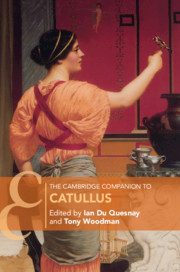Book contents
- The Cambridge Companion to Catullus
- The Cambridge Companion to Catullus
- Copyright page
- Contents
- Notes on Contributors
- Preface
- Introduction
- Chapter 1 Situating Catullus
- Chapter 2 Literary Liaisons
- Chapter 3 Catullan Intertextuality
- Chapter 4 Gender and Sexuality
- Chapter 5 Catullan Themes
- Chapter 6 Language and Style
- Chapter 7 Catullus and Metre
- Chapter 8 Catulli Carmina
- Chapter 9 Catullus and Augustan Poetry
- Chapter 10 Rewriting Catullus in the Flavian Age
- Chapter 11 The Manuscripts and Transmission of the Text
- Chapter 12 Editions and Commentaries
- Chapter 13 Catullus in the Renaissance
- Chapter 14 Catullus and Poetry in English since 1750
- Abbreviations and Bibliography
- Index Locorum
- General Index
Chapter 4 - Gender and Sexuality
Published online by Cambridge University Press: 09 April 2021
- The Cambridge Companion to Catullus
- The Cambridge Companion to Catullus
- Copyright page
- Contents
- Notes on Contributors
- Preface
- Introduction
- Chapter 1 Situating Catullus
- Chapter 2 Literary Liaisons
- Chapter 3 Catullan Intertextuality
- Chapter 4 Gender and Sexuality
- Chapter 5 Catullan Themes
- Chapter 6 Language and Style
- Chapter 7 Catullus and Metre
- Chapter 8 Catulli Carmina
- Chapter 9 Catullus and Augustan Poetry
- Chapter 10 Rewriting Catullus in the Flavian Age
- Chapter 11 The Manuscripts and Transmission of the Text
- Chapter 12 Editions and Commentaries
- Chapter 13 Catullus in the Renaissance
- Chapter 14 Catullus and Poetry in English since 1750
- Abbreviations and Bibliography
- Index Locorum
- General Index
Summary
Gender issues are deeply implicated in many, if not all, aspects of Catullus’ poetry: sexual invective, politics, persona theory, the character of Lesbia, poetics and intertextuality, and the representation of social relations. In fact, isolating such concerns and approaches within a chapter is somewhat misleading. One of the central contributions of feminist and gender studies is the insight that Roman discourses about sexual behaviour and gender may be deployed in the ‘pursuit of non-sexual (as well as sexual) ends’ and that it is impossible to separate off discourses about sexuality and gender from other discourses, especially those involving ‘other hierarchical systems of power’. Although Catullus’ sustained engagement with issues involving gender and sexuality has long been recognised, more recent scholarship has illuminated Catullus’ use and exploration of gender positioning and sexual invective to articulate such concerns as masculinity, social and political power and poetics.
- Type
- Chapter
- Information
- The Cambridge Companion to Catullus , pp. 70 - 88Publisher: Cambridge University PressPrint publication year: 2021

